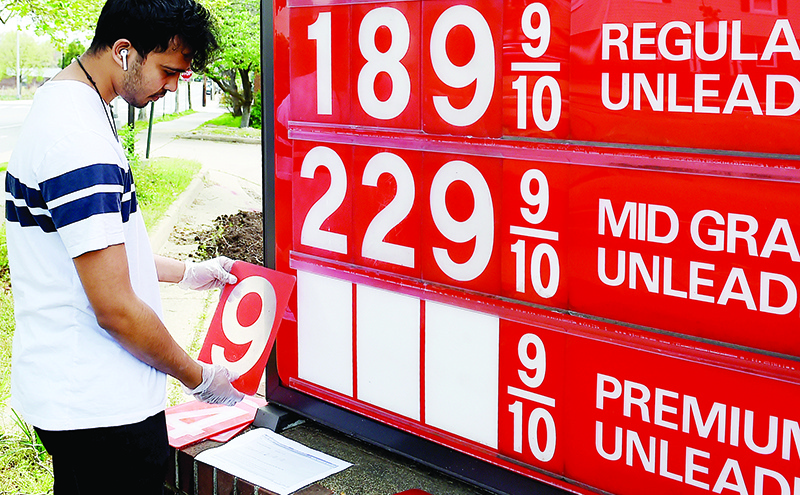
SINGAPORE: Oil prices soared yesterday as escalating tensions between the US and Iran in the crude-rich Gulf lent support to markets battered by a coronavirus-triggered demand shock and concerns about storage. Brent crude, the international benchmark, rose 11.8 percent to $22.79 a barrel in Asian afternoon trade. US benchmark West Texas Intermediate jumped 14.37 percent to $15.76 a barrel, extending big gains from a day earlier.
Still, prices remain at multi-year lows as lockdowns and travel restrictions to fight the virus batter demand and storage facilities are overwhelmed by excess supply. Markets have had a rollercoaster ride this week, with US crude falling into negative territory for the first time as traders sought to offload oil but could not find buyers as storage facilities are reaching capacity.
Phillip Futures cited "heightened risk in the Middle East" for the current rally, which began in the New York session Wednesday after the US issued new threats amid rising naval tensions in the Gulf. US President Donald Trump took to Twitter to say he had "instructed the United States Navy to shoot down and destroy any and all Iranian gunboats if they harass our ships at sea".
Iran meanwhile said it put its first military satellite into orbit, making it an emerging "world power". Washington alleges that the space program is a cover to develop ballistic missiles.
The Gulf is a major gateway for oil to reach international markets, and previous spikes in tensions between US and Iranian vessels have seen crude prices similarly surge higher.
The rising tensions overshadowed a weekly US inventory report that showed another big jump in crude stockpiles, including at the Cushing, Oklahoma hub where analysts say there is little remaining space as the virus saps demand. Phillip Futures however said that oil market watchers were divided as to the "motive of the president's statement as it is released at a time of the historic crash in West Texas Intermediate and Brent crude.
"The tweet is highly likely to be part of his administration's strategy to impact the oil price," they said in a note, adding that US shale had been badly hit by the oil price collapse.
Analysts however say that geopolitical tensions won't have a lasting impact if crude storage facilities are full. Even a deal by top global producers to reduce output by almost 10 million barrels a day has had little impact, with prices continuing to plummet.
Storage conundrum
The oil market, rocked by crisis this week as prices plunged below zero on rampant oversupply and demand-destroying coronavirus, faces the critical problem of where to store surplus crude.
"To put it simply, there is too much oil with too little space to store it," said TS Lombard economist Konstantinos Venetis. In recent weeks and months, prices crashed as the COVID-19 pandemic brings the global economy to its knees-and sends crude demand falling off a cliff, with the world on lockdown and oil-dependent sectors paralyzed. That has left the world awash with plentiful supplies of so-called black gold. "Storage demand accelerated from the second week of March onwards," said Ernie Barsamian, head of specialist brokerage The Tank Tiger.
Sub-zero oil
In a fresh twist this week, New York's light sweet crude turned negative on Monday for the first time in history. West Texas Intermediate (WTI) for May delivery collapsed to an unprecedented low of minus $40.32 per barrel as traders scrambled to sell before the contract expired Tuesday.
The negative price means that traders were actually forced to pay to have the crude taken off their hands-yet few could locate buyers with somewhere to store it. "With available storage in short supply, nobody wanted to hold a contract about to come due," added Venetis. This week's meltdown also saw European benchmark Brent North Sea oil touch a two-decade low of $15.98 on Wednesday, before rocketing higher on threats by US Donald Trump to shoot at Iranian boats in a key waterway for crude shipments.
Oil movers and shakers are now desperate for storage in part of the industry which operates with very limited spare capacity. "Global storage capacity is modest in relation to actual production," explained Frederic Rollin, investment adviser at Pictet Asset Management. - AFP




